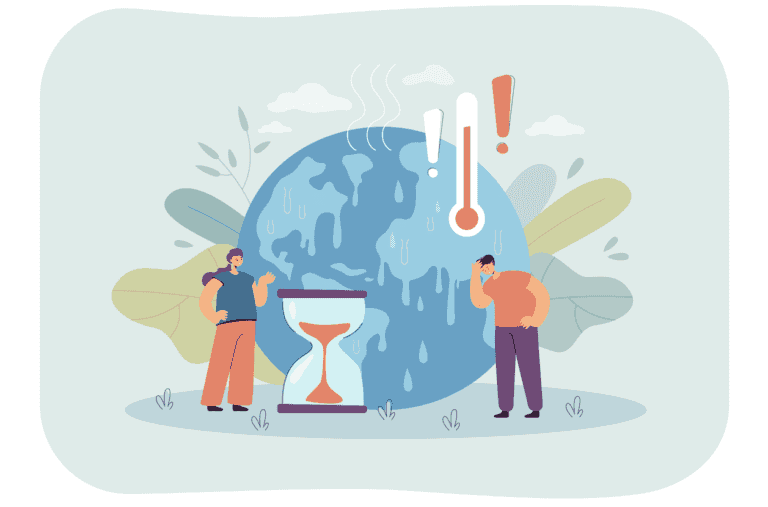Digital Responsibility at the heart of the fight against climate change
March 2023 was marked by two reports that highlight the urgency of acting to reduce greenhouse gas emissions in order to preserve our planet. The ADEME-Arcep report looks at the impact of digital technology on the environment, followed by the IPCC (Intergovernmental Panel on Climate Change) report, which takes stock of climate change. The IPCC study emphasizes the link between climate, ecosystems, biodiversity and human societies, and demonstrates once again the need to achieve carbon neutrality as soon as possible to preserve our common future.
What do these two reports have in common? Beyond providing a valuable knowledge base on the losses and damages caused by human activity, they both give concrete solutions, good practices to apply and short and long term answers to act in favor of a habitable world. Far from being fatalistic, these two studies show a way: that of hope through action. They provide the keys for all the actors in our society to act in synergy to fight against global warming.
As far as digital is concerned, good news: we already have a concrete field of action. By implementing a frugal and ethical approach applied to digital within organizations of all sectors, Responsible Digital has the potential to become a key player in the climate transition.

The carbon footprint of the digital sector in question
Although digital technology is often considered as a solution to reduce greenhouse gas emissions, it is also essential to assess the environmental impact of the digital economy in terms of energy consumption, creation of electronic waste... Often underestimated because it is invisible, digital pollution is nevertheless very real. Before looking at the levers for action, it is necessary to understand the problem:
Digital, like all technologies, requires resources to be manufactured (raw materials, transportation) and used (energy consumption, business), as well as a network and storage infrastructure to operate. Not to mention the end-of-life of equipment, with the problem of landfill. The carbon footprint of digital technology today depends mainly on equipment (smartphones, computers, televisions, etc.) and their manufacture. Ultimately, digital technology generates nearly 5% of the world's CO2 emissions.
The ADEME-Arcep report makes the following observation: if no measures are taken to reduce the environmental impact of digital technology between now and 2030, and if the current growth in use continues, data traffic will increase sixfold and the number of devices will increase by almost 65% compared to 2020.
In order to counteract the growing harmful impact of digital, adopting a Responsible Digital approach is now a must.
Sobriety and eco-design: concrete levers of action for a sustainable future
Despite its responsibility for climate change, digital technology is also an essential vector for decarbonization.
Digital technologies can be used to analyze and determine the environmental, social and societal footprint of companies. Because yes, the impact of digital technology does not stop at the environment, but also at how it influences the way we work as a society!
As the March 2023 IPCC report points out, "Prioritizing equity, climate justice, social justice, inclusion and just transition processes supports both adaptation, lower emissions and resilient human development."
To contribute to a positive digital impact, we must therefore make room for sobriety: this implies limiting the multiplication of services and equipment that are not essential and, above all, not sustainable. Reuse and reconditioning must become the norm in order to extend the life of equipment as much as possible and avoid the acquisition of new equipment. In companies, this approach must be applicable to all departments, but it must above all be measurable and measured. Solutions such as fruggr allow you to assess your environmental and social footprint and follow a continuous improvement objective.
Digital frugality can also be applied through eco-design. It consists of assessing the environmental impact of digital goods and services throughout their design phase, favoring sustainable and recyclable materials, reducing greenhouse gas emissions and supporting circular economy models. By adopting these practices, companies can contribute to the fight against global warming while improving their user experience, growing their market and further embodying CSR within the organization.

Roadmap for an ethical and responsible digital world
The awareness and discovery of possible levers of action naturally leads to the next step: action!
The first action is to understand the benefits of such a strategy and to take concrete steps to achieve it. Defining clear objectives that are shared by all stakeholders is essential to ensure the sustainability and durability of the strategy. There are many different approaches, depending on the issues facing the company or the sector in which it operates. However, any Responsible Digital Roadmap includes several essential actions:
- The implementation of a governance and internal structure dedicated to Responsible Digital
- Awareness and training of all actors, management and employees
- The measurement and evaluation of the direct and indirect impacts of the digital services and equipment used and/or developed
- The establishment of objectives with a well-defined timeframe (e.g., objective of a 50% reduction in web obesity within 3 years)
But also :
- Providing access to digital services for all in order to limit the digital divide
Whatever the starting point, a Responsible Digital strategy can meet the ambitions of companies as long as there is a shared vision and a solid commitment from all stakeholders. We can all contribute to the fight against climate change by acting on all aspects of our daily lives, starting with our digital usage.
Digital4Better, an ally for a successful sustainable digital strategy
By integrating the expertise of a company like Digital4Better (developer of fruggr) the implementation of a Responsible Digital Strategy, companies can benefit from advice and tools to identify relevant action levers, measure their environmental and social performance, and involve all stakeholders in this process.
Digital4better can, for example, help companies implement responsible purchasing policies for IT equipment, optimize the use of IT resources to reduce energy consumption, or educate employees and customers about the challenges of the responsible digital transition.
In short, Digital4Better's expertise can be a valuable asset for companies wishing to adopt a responsible digital approach and thus contribute to the fight against climate change.
